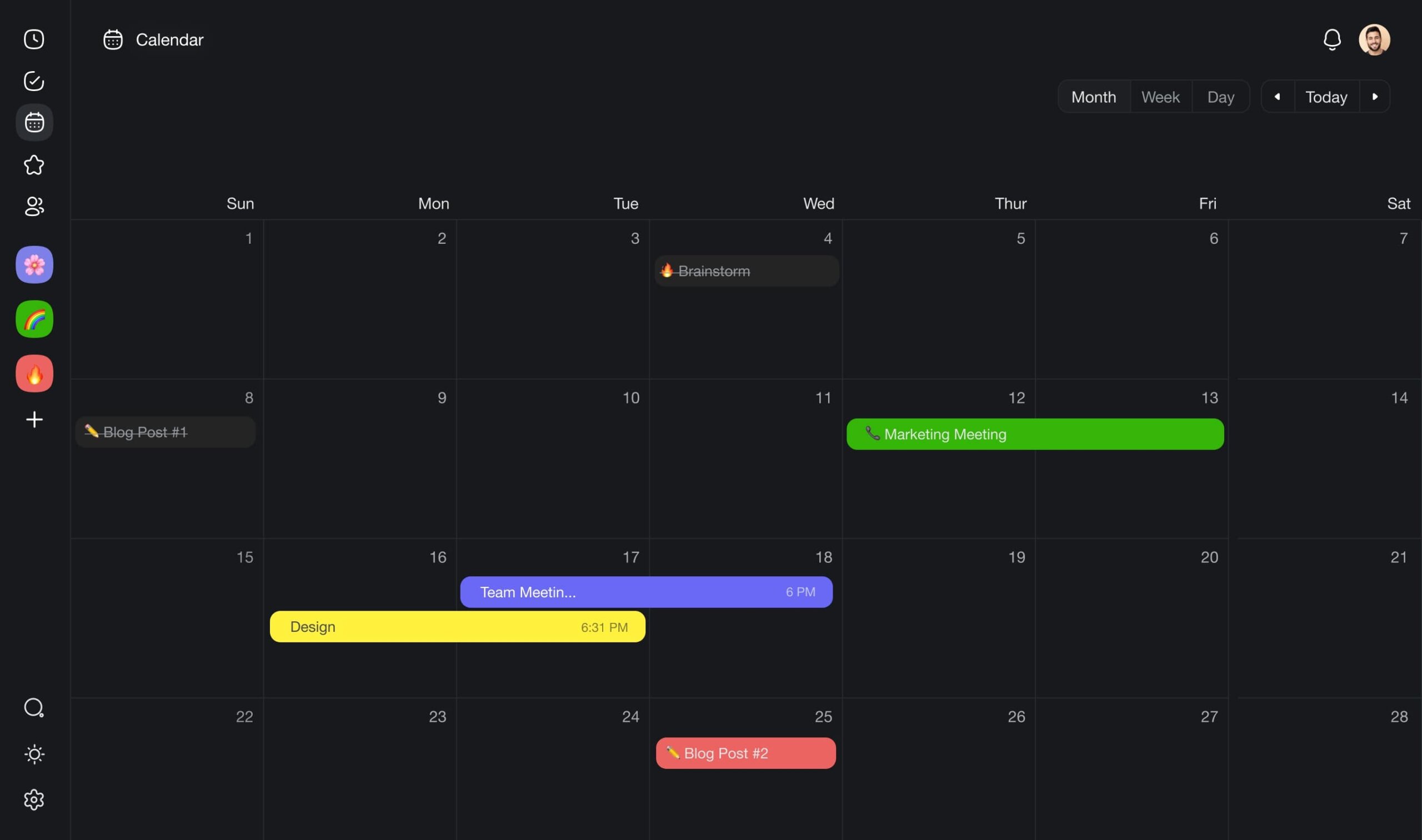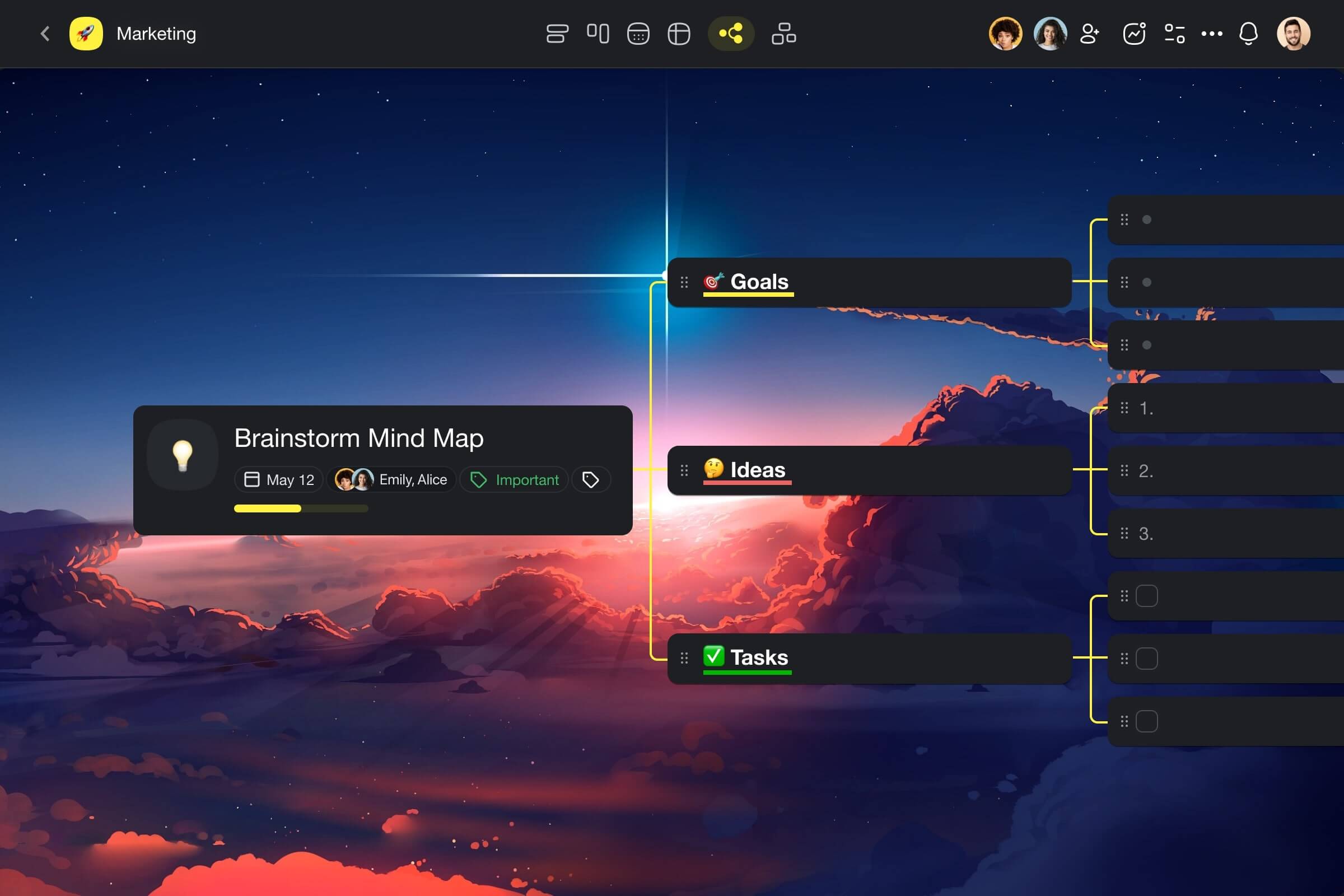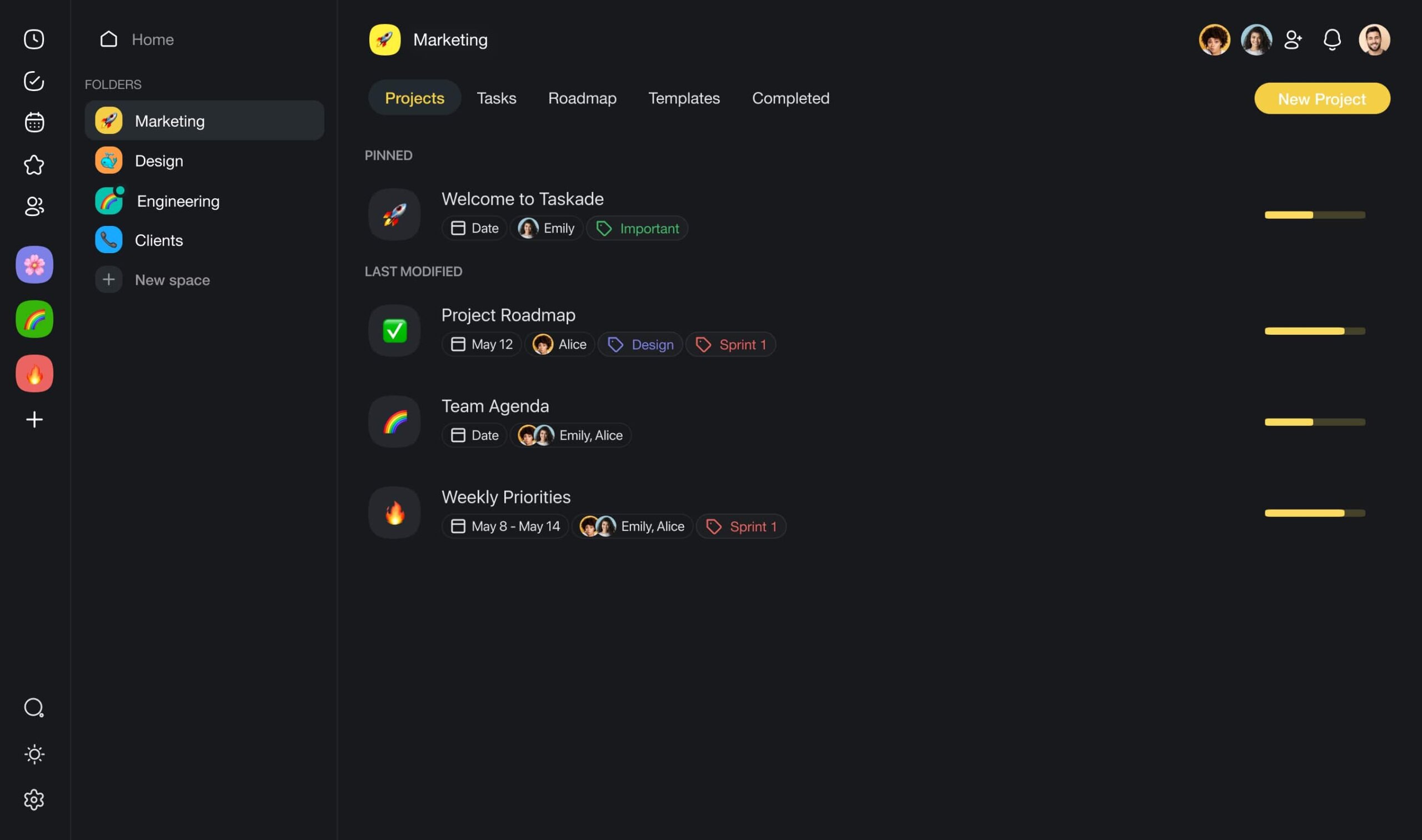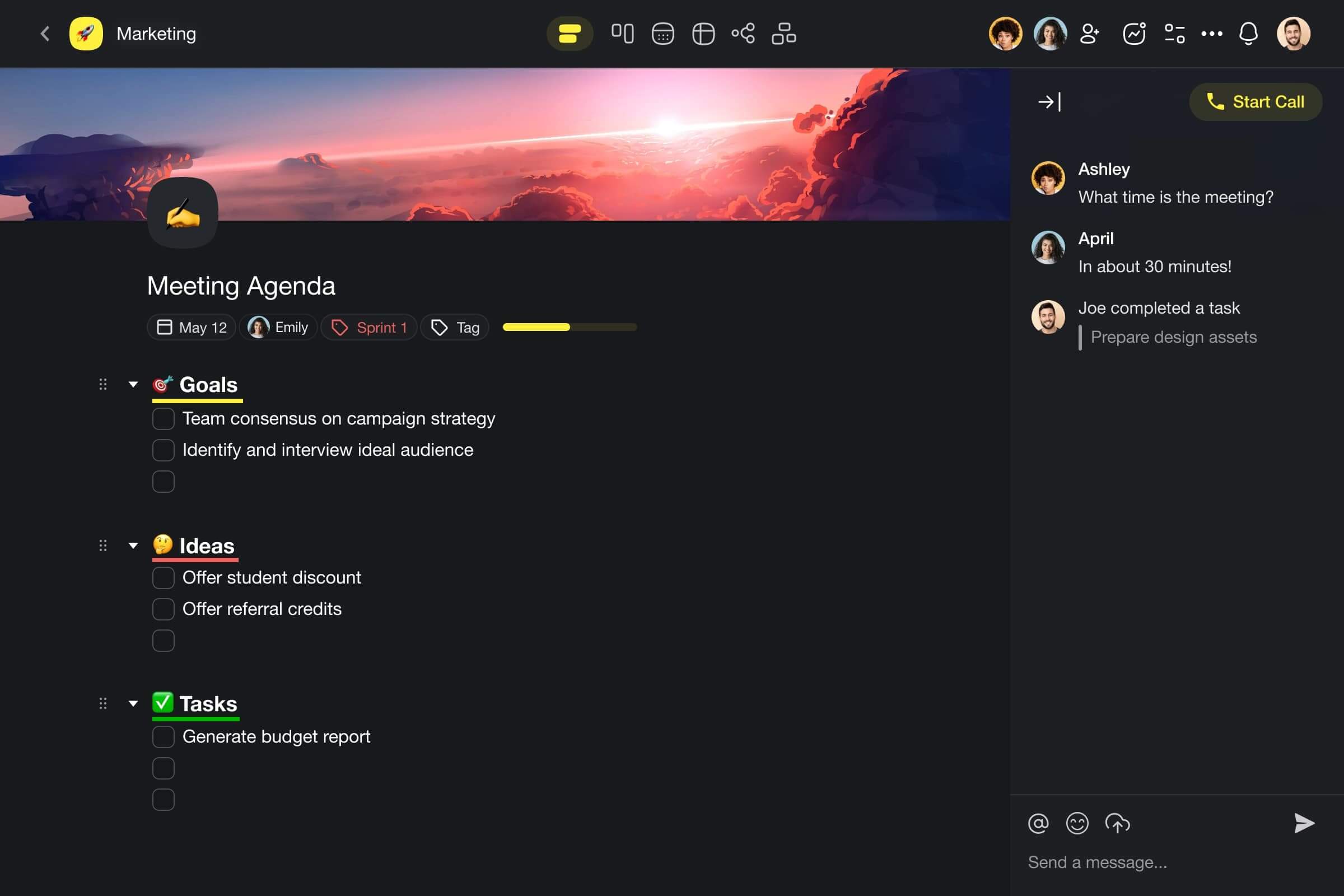Best Morning Routine Ideas For A Productive Start to Your Day in 2024
Did you know that 64% of American adults drink coffee? There's nothing like a rich, refreshing aroma of roasted beans in the morning. But you don't have to rely...
Did you know that 64% of American adults drink coffee? There's nothing like a rich, refreshing aroma of roasted beans in the morning. But you don't have to rely on caffeine alone to start your day. In today's article, we take a look at six morning routine ideas that will help you kick off your days energized and in a good mood. But first, let's start with some basics. ☕️
💡 Looking for tools instead?... Check our list of best project management tools for ideas.
⛅️ Why Is a Morning Routine Important for a Productive Day?
Roman emperor turned stoic superstar Marcus Aurelius was a firm believer in the power of rituals. With everything on his plate—a raging pandemic and wars on the northern borders were just a few of his troubles—he dedicated his mornings to productive pursuits.
“At dawn, when you have trouble getting out of bed, tell yourself: 'I have to go to work — as a human being. What do I have to complain of, if I’m going to do what I was born for — the things I was brought into the world to do? Or is this what I was created for? To huddle under the blankets and stay warm?’”
Marcus Aurelius, Meditations
Taking a leap in time, we can find other great minds committed to morning rituals.
Statesman, inventor, and the original self-made man Benjamin Franklin would wake up at 5 am to wash, pray, eat breakfast, and prepare for the day’s work. Milton, Voltaire, Kant, and many others also put great emphasis on the first few hours of their days.
The late Maya Angelou would have a morning coffee with her husband at 6 am and shut herself in a hotel room to focus on writing (accompanied by a bottle of sherry).
And that makes a lot of sense.
When you’re so occupied with the creative process, you can’t afford to hit snooze, roll over, and return to the embrace of a warm blanket.
But even if you’re not a creative type, you should still own your mornings. Here’s why. 👇
Lower Decision Fatigue
According to social psychologist Roy F. Baumeister, making decisions is a taxing exercise. Every decision you make comes at a mental cost called decision fatigue.
“The link between willpower and decision making works both ways: Decision making depletes your willpower, and once your willpower is depleted, you’re less able to make decisions. If your work requires you to make hard decisions all day long, at some point you’re going to be depleted and start looking for ways to conserve energy [...]”
Roy F. Baumeister, Willpower: Rediscovering the Greatest Human Strength
“What will I wear today?” 👔
“What will I eat for breakfast?” 🥯
“What route will I take to work?” 🚴♀️
Of course, on top of those trivial choices, there are more weighty ones like health, family, and business matters. As those decisions stack up, you're more likely to procrastinate on calling the shots or make rushed, uncalculated choices you'll come to regret later.

A bullet-proof morning routine can make your decision-making process easier.
Instead of grappling with petty conundrums, you can figure things out in advance. This, in turn, will leave you with the mental bandwidth to take ownership when the stakes are much higher.
Engage Autopilot Mode
Getting up at 5, 4, or 3 am won’t get you far if you don’t start the day with a plan.
Even if you somehow resist mashing snooze and drag yourself out of bed, you’ll feel like a walking corpse, wandering aimlessly around the house until you fall asleep where you stand.
A solid morning routine puts you into autopilot mode.
It gives you a clear plan of action and something to look forward to—a morning jog, a hot cup of coffee, your favorite podcast, or a walk around the block with your dog.
Routines are especially useful for activities that require a significant amount of willpower.
You’ll be more likely to complete a hard workout, even if it’s just going through the motions, if you have it planned down to the last repetition. You don’t think about it; you just do.
Keep Anxiety at Bay
Don’t like uncertainty? You’re not alone.
A 2016 study published in Nature Communication confirmed that there's a link between uncertainty and stress. It turns out the human brain is hardwired to dislike “not knowing.”
"The most stressful scenario is when you really don't know . It's the uncertainty that makes us anxious. The same is likely to apply in many familiar situations, whether it's waiting for medical results or information on train delays."
Dr. Robb Rutledge, University College London and Max Planck University College(1)
Routines, on the other hand, let you focus on what you can control.
For instance, leaving your work clothes or keys in the same place every day reduces the stress and frustration of having to look for them in the morning.
You can’t control everything, but you can still move some obstacles out of the way.
🔄 How to Make Morning Routine Ideas Stick?
1. Create Triggers
One of the biggest obstacles to creating a sustainable routine is the lack of specificity.
Subscribing to a gym in January to “get healthy” won’t get you far. Without a clear idea of where you’re going, you’ll quickly give up on your resolutions (80% of people do).(2)
To make your morning routine ideas stick, you need a trigger.
Author of Atomic Habits, James Clear argues that there are five triggers that can kick-start any habit.(3) You can apply those triggers selectively to prop up each step of your morning routine:
⏰ Time: 6 am ➡ stretching
🏡 Location: bathroom ➡ floss
⏩ Preceding event: get on a treadmill ➡ listen to a podcast
🤩 Emotional state: anger ➡ meditate
🤝 Other people: best fried ➡ jog together in the morning
Look at your morning routine ideas and think of a cue that can trigger each habit. The opposite is also true. Look for negative triggers that throw off your routine and sabotage progress.
2. Set Feasible Daily Goals
Mark Wahlberg used to wake up at 2.30 am (now it’s a more “reasonable” 3.30 am) to hit the gym. Dwayne “The Rock” Johnson—we have an impressive mashup of celebrities in this article—puts in two workout sessions, 3-4 hours each, six days a week.
While those routines are commendable, they may not be compatible with your life.
Instead, you need a set of personalized goals that'll work for you.
In the 1960s, psychologists Gary Latham and Edwin A. Locke collaborated on a goal-setting theory that included five requirements for setting feasible, realistic daily goals:
🤔 Clarity: Identify the exact steps and methods to achieve your goal.
🧗♀️ Challenge: Set a goal slightly above your reach.
🔒 Commitment: Own the goal and take responsibility for it.
💡 Feedback: Ask for feedback or identify metrics to track progress.
🧩 Task complexity: Break your goal into smaller, bite-sized chunks.(4)
Look at what you want to achieve, and try to construct your daily goals using the five criteria.
Don’t try to brute-force a 100-step routine overnight. Make it 5 or 6 steps instead; the shorter it is, the better. Ask a friend or a colleague to keep you accountable and provide feedback. Finally, commit to your goal and make progress, one tiny step at a time.
3. Don’t Take Days Off
A routine is, well, a routine. You need to stick to it if you want to see results. The problem is good habits are often thrown off by the smallest distraction or sign of resistance.
There will be times when you won’t feel well.
There will be times when you’ll go to bed late.
There will be times when the weather will catch you off guard.
But building a sustainable morning routine is a long-term commitment.
According to a 2009 study published in the “European Journal of Social Psychology,” it takes an average of 2 months (between 18 and 254 days) to form a habit. While skipping your greens once won’t derail your routine, having five “cheat days” a week will probably break the pattern.(5)
Plus, it’s just unhealthy. 🧁
So, if you absolutely must break your routine, do so, but don’t take more than one day off. Keep the streak going and stick to your morning ritual. It’ll only get easier.
🚀 The 6 Best Morning Routine Ideas for Productivity
Let’s make one thing clear.
You can’t steal morning routine ideas from the internet and call it a day.
Well, technically you can, but there’s a catch. Everybody has different character traits, motivations, and life experiences. If you want to adopt a set of habits you found online, you need to tailor them to your unique life circumstances before you go all in.
With that in mind, take the ideas below for what they are—simple ideas.
Experiment, mix and match different habits, and figure out the ideal morning routine for yourself. Just don’t forget to have fun while doing so! 🥳
🚀 The Productivity Guru
Tackling work first thing in the morning isn’t such a bad idea. You get to start early, enjoy your coffee in blissful silence, and make headway while everybody is still asleep.
The only rule? Eat your biggest, meanest frog for breakfast. 🐸
In the book 2001 Eat That Frog!, productivity expert Brian Tracy recommends dealing with the most difficult/important tasks (frogs) first. Tracy claims eating the frog early on helps overcome procrastination, engage in deep work, and set the right momentum for the rest of the day.
And he may be on to something.
In 2019, researchers looked at 6 years of patient records of 84 doctors in an East Coast emergency room. They noticed that doctors who took easier cases showed better short-term performance. However, the performance of doctors who picked harder cases was actually higher in the long term, partly because they would rack up more experience.(6)
Here's how you can use Tracy's Eat That Frog method in Taskade. 👇
So, if productivity is what you’re after, try these steps:
Don’t use the snooze button!
Reflect on what you achieved the previous day.
Complete the most difficult tasks of the day.
Reply to emails and get to inbox zero.
Work on your business or side hustle.
Listen to your favorite productivity podcast.
Use Taskade to schedule tasks and keep track of progress! 🐑
📚 The Book Mole
A quarter of U.S. adults didn't read a single book in 2021.
The most common excuse? “I don’t have enough time.” 🤷♂️
If you belong to that group, your new morning routine can turn you into a true book mole. It’s much easier to focus on the words in front of you where there’s nobody around to distract you.
Don’t like paperbacks? No problem.
Listening to books on the go is the new black. With the global audiobook market expected to hit $35 billion by 2030, you won’t run out of reading material anytime soon.(7) If you can’t afford to splurge on audiobooks, there’s a good chance your local library will lend you some for free.

Ready to dust off your bookshelf?
Here's how a recipe for a productive morning with a book:
Make a list of the books you want to read each month.
Focus on non-fiction (fiction works best in the evenings).
Grab a cup of coffee (or tea) and get comfortable.
Don’t check your phone until you’ve finished reading.
Start with just a few pages a day and work your way up.
(optional) Listen to an audiobook and take notes.
Grab this free reading list checklist to track your progress.
🏋️ The Olympian
Regular physical activity has a lot of benefits. It can boost your mood, bump energy levels, and even reduce the risk of diabetes and other chronic diseases. Not bad, huh?
One study looked at people who exercised on a treadmill at 7 am, 1 pm, and 7 pm The group that exercised in the morning saw a greater reduction in nocturnal systolic blood pressure. The morning birds also slept better compared to other groups, with significantly longer deep sleep.(8)
The lesson for today?
Put exercise high on your daily schedule.
Checking off your daily run or yoga session after waking up will give you a powerful energy boost and a feeling of accomplishment for the rest of the day. It will also make you less likely to skip a day because you’re too tired or have more “interesting” things to do in the evening.

Here's how to use your mornings to boost physical and mental health:
Drink water to rehydrate yourself after the night.
Take a cold shower to prime your body.
Go for a jog or take a walk around the block.
Try a morning stretching routine.
Hit the gym when it’s still empty.
Reward yourself with a post-exercise snack.
💡 Need help with tracking your workouts? Check our comparison of the best to-do list apps.
🧘♂️ The Morning Sage
In the 2018 book My Morning Routine, authors Benjamin Spall and Michael Xander share the lessons they learned from interviewing 300 high achievers about their morning routines. What stands out is that many of those people spend their mornings meditating.
And for all the good reasons. Science says the practice of meditation can:
😤 Reduced stress
🛌 Improve sleep quality
🤔 Enhance self-awareness
🔎 Improve attention
♥️ Lower blood pressure
And much more.
A review of 23 studies that looked at the benefits of meditation revealed that mindfulness meditation could improve “selective and executive attention” (focusing on an object and task execution) as well as the ability to maintain focus for longer.(9)
If you’re still not convinced, check this video for more cool meditation benefits. 👇
Here are a few tips that'll help you design more mindful morning routines:
Carry out your morning routine slowly and mindfully.
Try guided meditation apps like Headspace or Calm.
Practice conscious breathing.
Write in your journal and reflect on the previous day.
Go for a walk and contemplate nature.
💤 The Natural Sleeper
Did you know there are better tunes to wake up to than a punishing “beep beep beep?”
As it turns out, self-awakening is much gentler on the body than using an alarm clock.
Who would’ve thought? 🤔

A 2005 study from Japan found that waking up according to your natural circadian rhythm comes with a much lower blood pressure/heart rhythm spike than using an alarm.(10)
We get it. Giving up on a trusty wake-up tune may be terrifying at first. But you don’t have to take a leap of faith to feel well-rested. Use these tips to start your mornings in a lower gear:
Try going to bed at the same time every night.
If you can’t fall asleep, read fiction or listen to a podcast.
Stop doomscrolling and watching the news before bed.
Take a warm bath or shower to relax.
Ban all screens (phones, tablets, TVs) from the bedroom.
Set your alarm clock as late as possible as a backup.
Stick to the pattern for a few weeks and check the results.
🥗 The Food Lover
A toast and coffee sounds like a perfectly reasonable way to start a day. The rich smell of roasted beans, the crunchy, crispy sound of fresh bread.
So, why do 1 in 5 U.S. adults skip breakfast?(11) 🤔
If you don’t have time for breakfast, you may need to reconsider your life choices. A 2021 review of 14 studies discovered that people who eat breakfast seven times a week tend to have a lower incidence of heart disease, diabetes, and obesity compared to those who don't.(12)

Getting up early to prepare your food has many compelling benefits. It’s cheaper, healthier, and lets you eat what you like instead of what you manage to grab on the go.
But wait, it gets better.
A 2007 study of young, healthy adults found that a non-cereal breakfast correlates with better cognitive performance—the cereal group scored lower in the test—compared to not eating breakfast at all. The breakfast group also showed improved mood and memory.(13)
“The consumption of breakfast produced attenuation in the decline of cognitive performance, satiety and mood observed in the breakfast omission condition. In addition, short-term and delayed verbal memory was significantly enhanced following the non-cereal breakfast relative to the cereal breakfast”
Here are a few morning routine ideas that will help you savor your day:
Don’t rush your breakfast; take it one bite at a time.
Cook meals for the next two days.
Prepare and pack lunch for work.
Try a new cooking recipe.
Turn your morning coffee into a ritual.
Don’t check your phone when eating.
Use this food diary template to track your eating habits.
And that’s it! 🥳
💡 Before you go... Don't want to waste time setting things up?
Taskade's AI tools will help you streamline your day before it even starts. From auto-generating meal plans to optimizing workflows and prioritizing tasks by impact, Taskade is the only tool you need to bring order to the chaos of everyday commitments.




Master your day with Taskade AI! 🤖
🪄 AI Generator: Automate the planning of days. Input your goals and let the generator organize your daily agenda, from meetings to personal projects.
🤖 Custom AI Agents: Tailor AI agents to streamline your daily routines in the background, from replying to emails to scheduling tasks.
💬 AI Chat: Resolve daily queries or gather information with a conversational AI. It's like having a personal researcher to clarify doubts or suggest ideas.
✏️ AI Assistant: Enhance daily productivity with an assistant that helps organize, write, edit, and prioritize. Call it with with convenient /slash commands.
🔀 AI Files/Document Converter: Transform how you handle daily documents. Convert notes into organized lists, scan and summarize readings, and more.
📄 Media Q&A: Engage directly with your documents through an AI-driven interactive session. Think of it as a daily briefing with your own content.
🗂️ AI Prompt Templates Library: Make the most of Taskade's AI features. Access a variety of AI prompts designed to simplify and automate your daily routines.
Frequently Asked Questions About Morning Routine Ideas
What is the best early morning routine?
The best morning routine is one that works for you. This depends on whether you work from home or the office, need to drive kids to school, or how long your commute is. Make your routine sustainable so you can stick to it for years to come.
What is the best thing to do first thing in the morning?
Wake up early enough so you don't have to rush. After that, you have the world to yourself. You can meditate, brew coffee, hit the gym, prepare breakfast, or spend some extra time with your family. The choice is all yours!
How do I start with morning energy?
A whopping 64% of American adults drink coffee every day. But if you’re not a fan of caffeine, you can try a few great alternatives. Some productivity experts recommend taking a cold shower first thing in the morning. Taking a brisk walk works equally well.
How can I make my morning routine fun?
Gamify your morning routine to make it fun and entertaining. You can print a calendar page and make each successful day with an “X.” Alternatively, use a task management or habit-tracking app to track your progress. Don’t forget to reward yourself for each successful day!
How can I make a good morning schedule?
Look at your schedule. What is holding you back? Are you waking up at the same hour every day? Or are you sleepy and tired for the better part of the morning? Identify obstacles and take small steps to put new, sustainable habits in place.
